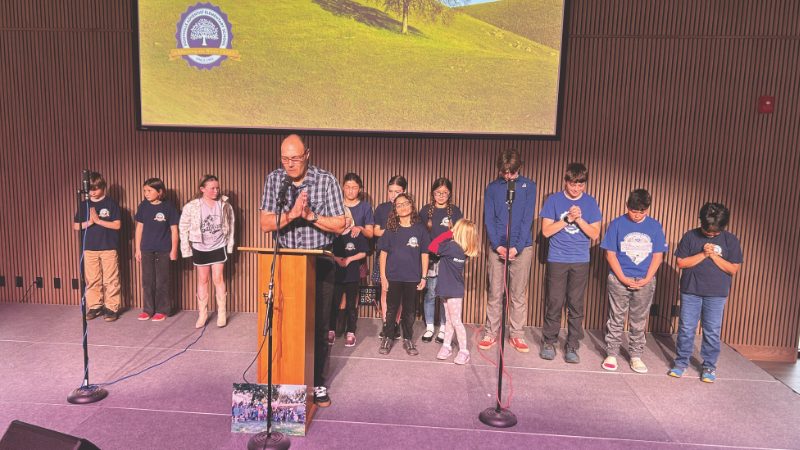The primary duty of the Israelites during the celebration of the New Year, as articulated by priestly law, was to be “altogether joyful,” (Deuteronomy 16:15)1 and to “rejoice before the Lord" (Leviticus 23:40) in recognition of the numerous blessings bestowed upon them through their agricultural endeavors. To articulate this joyful acknowledgment of divine favor, Israel developed psalms dedicated to national or communal thanksgiving.
This festival—known as the Feast of Tabernacles or Sukkot—occurred at the conclusion of their year, allowing for a moment of gratitude for the blessings received over the past 12 months. The New Year coincided with the end of the agricultural cycle, marking the completion of the harvest of barley, wheat, grapes, and olives. Consequently, the abundant harvests became a cherished theme of thanksgiving. Additionally, other themes emerged, including the recurring deliverance of Israel throughout history, where God guided His people from hardship to liberation, as well as the assistance He provided during periods of intense persecution.
Among the many psalms that contain words of thanksgiving, Psalm 65 extols God as the source of abundance (verses 9-12) and emphasizes His role as the creator of the earth (verses 6-8), themes that resonate during the Israelite New Year. The psalmist is drawn to the vivid imagery of early growth that follows the winter rains (verses 10-13). Reflecting on the overall harvest of the year, the psalmist embodies the spirit of the autumn New Year celebration.
This communal expression of gratitude is regarded as the fulfillment of promises made by the Israelite farmers during the planting season. Should the Lord bless them with a bountiful and successful year, they would honor their commitments at the sanctuary. The psalm begins by depicting Zion as the principal national hub where the vows of all Israelites are to be fulfilled.

Praise is due to thee,
O God, in Zion;
and to thee shall vows be performed,
O thou who hearest prayer!
To thee shall all flesh come
on account of sins.
When our transgressions prevail over us,
thou dost forgive them (Psalm 65:1-3).
In times of peril, when crops appear to be in danger and when the Israelites perceive that their transgressions have obstructed divine assistance, they seek refuge in God's temple. With the recent blessing of a plentiful harvest, this abundance serves as a definitive sign of His forgiveness toward them.
Every Israelite, regardless of status, perceives themselves as part of the chosen people of God, selected from all nations on earth (Deuteronomy 7:6). Consequently, they approach God in worship with a sense of entitlement and receive His grace of forgiveness. Additionally, they are rejuvenated by the material blessings that flow from God's holiness and emanate from His temple to His people. The psalmist suggests that the worship conducted by God's people in the temple establishes a connection with the divine sources of power. Thus, he expresses his praise in song.
Blessed is he whom thou dost choose and bring near,
to dwell in thy courts!
We shall be satisfied with the goodness of thy house,
thy holy temple! (Psalm 65:1-3).
Time and again, when the faithful have approached God in their times of need, He has provided them with answers. However, He serves as a source of assurance not only for His followers but also for those residing in the far reaches of the earth. These statements reflect a time when the dispersion had already commenced.
By dread deeds thou dost answer us with deliverance,
O God of our salvation,
who art the hope of all the ends of the earth,
and of the farthest seas (Psalm 65:5).
The most remarkable of all God’s “deeds” was the act of bringing the world into existence. Thus, the psalmist transitions into his primary theme of thanksgiving, acknowledging God as the Creator of the universe. The significance of this theme during the New Year celebration arises from the belief that a new creation occurs each year. Through these ancient ceremonies, the original act of creation was symbolically reenacted. Through their rituals, the proper functioning of all elements—sun, moon, stars, and seasons—was ensured, along with the cleansing of the previous year’s guilt and impurities, thereby securing safety and prosperity for the year ahead.
It’s interesting that it encapsulates the essence of the Babylonian New Year celebration, which featured the annual ritual battle between Marduk and Tiamat.2 But, unlike the Babylonian festival, the Israelite ceremony emphasized God’s act of creation, which remained the foundation of their trust in Him. Empowered by His unmatched strength as Creator, He established the mountains and calmed the tumultuous seas. He instilled fear even in the terrifying creatures that dwelled in the waters surrounding the earth. Subsequently, He fashioned an orderly world, marked by the rhythm of morning and evening, day and night.
Who by thy strength hast established the mountains,
being girded with might;
who dost still the roaring of the seas,
the roaring of their waves,
the tumult of the peoples;
so that those who dwell at earth’s farthest bounds
are afraid at thy signs;
thou makest the outgoings of the morning and the evening
to shout for joy (Psalm 65:6-8).
The subsequent words are intricately linked to the preceding statements. For the psalmist, who observes the bountiful harvest that signifies God‘s benevolence throughout the year, perceives a recurrence of divine creation—a repetition and an ongoing process. Just as in the primordial beginning, when He subdued the chaotic forces that threatened an orderly cosmos, vanquishing and eradicating them, He has similarly triumphed over the enduring adversaries of the harvest—famine, locusts, hot winds, and disease. Furthermore, in the spiritual realm of His people, He has removed all forms of evil—wrongdoers, sin, and corruption—transforming the land of His followers into a paradise once more.
In the verses that follow, God is depicted as the Creator, perpetually renewing and advancing His creation. It is essential to recognize that for the ancient Hebrews, acts of worship, particularly the expression of gratitude, signified the commencement of a New Year. Consequently, these rituals result in a new creation each year. Worship, therefore, was a form of creative expression. The rituals of the cult were not merely symbolic; they were transformative. They achieved tangible outcomes and engaged with the creative, life-giving essence of God.
These reflections culminate in one of the most beautiful depictions found within the Psalms. We observe the fertile land of Palestine, fully aware of the miraculous and mysterious process of growth. There is a profound recognition of God as the generous provider. The text vibrates with creative vitality. Nature offers its homage to its Creator. For this psalmist, the focal point of contemplation is not the earth itself, but God; it is not “it,” but “Thou.”
Thou visitest the earth and waterest it,
thou greatly enrichest it;
the river of God is full of water;
thou providest their grain,
for so thou hast prepared it.
Thou waterest its furrows abundantly,
settling its ridges,
softening it with showers,
and blessing its growth.
Thou crownest the year with thy bounty;
the tracks of thy chariot drip with fatness.
The pastures of the wilderness drip,
the hills gird themselves with joy,
the meadows clothe themselves with flocks,
the valleys deck themselves with grain,
they shout and sing together for joy (Psalm 65:9-13).
What a poet to express such thoughts! What a spirit the people possessed to dream like that!
Psalm 65 is a powerful song of praise and thanksgiving that invites us to reflect on the many dimensions of God’s relationship with the world. Through its vivid imagery and theological depth, the psalm celebrates God’s gracious forgiveness, His sovereign power, and His abundant provision. It reminds us that true worship is rooted in an awareness of God’s goodness and that thanksgiving is the natural response to His ongoing care.
In the broader context of biblical literature, Psalm 65 stands as a testament to the central themes of the Psalms—God’s majesty, mercy, and faithfulness. As we come to the final months of this year and consider this psalm, we are encouraged to cultivate a posture of gratitude, recognizing that every aspect of our lives, from the spiritual to the material, is sustained by God’s gracious hand. Whether in times of abundance or need, Psalm 65 calls us to join in the chorus of creation, lifting our voices in praise and thanksgiving to the God who reigns over all.
_____________________________
Alberto Valenzuela is associate director of communication and community engagement of the Pacific Union Conference and the Recorder editor.
1 Unless otherwise indicated, all Scripture quotations are from the Revised Standard Version.
2 https://en.wikipedia.org/wiki/Akitu
Un alegre himno de acción de acción de gracias
Por Alberto Valenzuela
El deber principal de los israelitas durante la celebración del Año Nuevo, tal como lo articulaba la ley sacerdotal, era estar «completamente alegres» (Deuteronomio 16:15)1 y «regocijarse ante del Señor» (Levítico 23:40) en reconocimiento de las numerosas bendiciones que se les otorgaban a través de sus esfuerzos agrícolas. Para articular ese gozoso reconocimiento del favor divino, Israel desarrolló salmos dedicados a la acción de gracias nacional o comunitaria.
Ese festival, conocido como la Fiesta de los Tabernáculos o Sucot, ocurría al final de su año, lo que permitía un momento de gratitud por las bendiciones recibidas durante los últimos 12 meses. El Año Nuevo coincidía con el final del ciclo agrícola, marcando la finalización de la cosecha de cebada, trigo, uvas y aceitunas. En consecuencia, las abundantes cosechas se convirtieron en un tema preciado de acción de gracias. Además, surgieron otros temas, incluida la liberación recurrente de Israel a lo largo de la historia, donde Dios guió a su pueblo de la dificultad a la liberación, así como la asistencia que le brindó durante períodos de intensa persecución.
Entre los muchos salmos que contienen palabras de acción de gracias, el Salmo 65 ensalza a Dios como la fuente de la abundancia (versículos 9-12) y enfatiza su papel como creador de la tierra (versículos 6-8), temas que resuenan durante el Año Nuevo israelita. El salmista se siente atraído por las vívidas imágenes del crecimiento temprano que sigue a las lluvias invernales (versículos 10-13). Reflexionando sobre la cosecha general del año, el salmista encarna el espíritu de la celebración del Año Nuevo en otoño.
Esa expresión comunitaria de gratitud se considera como el cumplimiento de las promesas hechas por los agricultores israelitas durante la temporada de la siembra. Si el Señor los bendice con un año abundante y exitoso, honrarán sus compromisos en el santuario. El salmo comienza describiendo a Sión como el principal centro nacional donde se deben cumplir los votos de todos los israelitas.

A ti, oh Dios, en Sión,
te espera la alabanza,
y a ti se te deben cumplir las promesas.
Tú escuchas la oración,
a ti acude todo mortal.
Cuando nuestras iniquidades
y nuestros delitos nos abrumaban,
tú los perdonaste (Salmo 65:1-3).
En tiempos de peligro, cuando las cosechas parecen estar en peligro y cuando los israelitas perciben que sus transgresiones han obstruido la asistencia divina, buscan refugio en el templo de Dios. Con la reciente bendición de una cosecha abundante, esa abundancia sirve como una señal definitiva de su perdón hacia ellos.
Cada israelita, independientemente de su estatus, se percibe a sí mismo como parte del pueblo elegido de Dios, seleccionado de todas las naciones de la tierra (Deuteronomio 7:6). En consecuencia, se acercan a Dios en adoración con un sentido de derecho y reciben su gracia de perdón. Además, son rejuvenecidos por las bendiciones materiales que fluyen de la santidad de Dios y emanan de su templo a su pueblo. El salmista sugiere que la adoración llevada a cabo por el pueblo de Dios en el templo establece una conexión con las fuentes divinas de poder. Por lo tanto, expresa su alabanza en cantos.
¡Dichoso aquel a quien tú escoges,
al que atraes a ti para que viva en tus atrios!
Saciémonos de los bienes de tu casa,
de los dones de tu santo Templo (Salmos 65:4).
Una y otra vez, cuando los fieles se han acercado a Dios en sus momentos de necesidad, él les ha contestado. Sin embargo, él sirve como una fuente de seguridad no solo para sus seguidores, sino también para los que residen en los confines de la Tierra. Esas declaraciones reflejan un momento en el que la dispersión ya había comenzado.
Tú, oh Dios y Salvador nuestro,
nos respondes con asombrosas obras de justicia;
tú eres la esperanza de los confines de la tierra
y de los más lejanos mares (Salmo 65:5).
La más notable de todas las «obras» de Dios fue el acto de traer el mundo a la existencia. Por lo tanto, el salmista pasa a su tema principal de acción de gracias, reconociendo a Dios como el Creador del universo. La importancia de ese tema durante la celebración del Año Nuevo surge de la creencia de que cada año se produce una nueva creación. A través de esas ceremonias antiguas, el acto original de la creación se recreaba simbólicamente. A través de sus rituales, se aseguraba el funcionamiento adecuado de todos los elementos (sol, luna, estrellas y estaciones), junto con la limpieza de la culpa y las impurezas del año anterior, asegurando así la seguridad y la prosperidad para el año venidero.
Es interesante que encapsula la esencia de la celebración del Año Nuevo babilónico, que presentaba la batalla ritual anual entre Marduk y Tiamat.2 Pero, a diferencia de la fiesta babilónica, la ceremonia israelita enfatizaba el acto de creación de Dios, que seguía siendo el fundamento de su confianza en él. Fortalecido por su fuerza inigualable como Creador, él estableció las montañas y calmó los mares tumultuosos. Infundió miedo incluso en las aterradoras criaturas que habitan en las aguas que rodeaban la tierra. Posteriormente, creó un mundo ordenado, marcado por el ritmo de la mañana y la tarde, el día y la noche.
Tú, con tu poder, formaste las montañas,
ceñido de fuerza.
Tú calmaste el rugido de los mares,
el estruendo de sus olas
y el tumulto de los pueblos.
Los que viven en remotos lugares se asombran ante
tus prodigios;
desde el amanecer hasta el anochecer
tú inspiras cantos de alegría (Salmo 65:6-8).
Las palabras siguientes están intrincadamente vinculadas a las declaraciones anteriores. Porque el salmista, que observa la abundante cosecha que significa la benevolencia de Dios durante todo el año, percibe una recurrencia de la creación divina, una repetición y un proceso continuo. Al igual que en el principio primordial, cuando sometió a las fuerzas caóticas que amenazaban un cosmos ordenado, venciéndolas y erradicándolas, ha triunfado de manera similar sobre los adversarios perdurables de la cosecha: el hambre, las langostas, los vientos caniculares y las enfermedades. Además, en el reino espiritual de su pueblo, ha eliminado todas las formas de maldad —los malhechores, el pecado y la corrupción—, transformando la tierra de sus seguidores en un paraíso una vez más.
En los versículos que siguen, Dios es representado como el Creador, renovando y avanzando perpetuamente su creación. Es esencial reconocer que para los antiguos hebreos, los actos de adoración, particularmente la expresión de gratitud, significaban el comienzo de un Año Nuevo. En consecuencia, esos rituales dan como resultado una nueva creación cada año. La adoración, por lo tanto, era una forma de expresión creativa. Los rituales del culto no eran meramente simbólicos; eran transformadores. Lograban resultados tangibles y se comprometían con la esencia creativa y vivificante de Dios.
Esas reflexiones culminan en una de las representaciones más hermosas que se encuentran en los Salmos. Observamos la tierra fértil de Palestina, plenamente conscientes del milagroso y misterioso proceso del crecimiento. Hay un profundo reconocimiento de Dios como el generoso proveedor. El texto vibra con vitalidad creativa. La naturaleza ofrece un homenaje a su Creador. Para ese salmista, el punto focal de la contemplación no es la tierra misma, sino Dios; no es «eso», sino «Tú».
Cuidas la tierra, la riegas
y la enriqueces abundantemente.
Los arroyos de Dios se llenan de agua,
para asegurarle trigo al pueblo,
porque así preparas el campo.
Empapas los surcos, nivelas sus terrones,
reblandeces la tierra con lluvias abundantes
y bendices sus renuevos.
Tú coronas el año con tus bondades
y tus carretas se desbordan de abundancia.
Rebosan los prados del desierto;
las colinas se visten de alegría.
Pobladas de rebaños están las praderas
y cubiertos los valles de trigales,
aclaman y cantan alegres. (Salmo 65:9-13).
¡Qué poeta para expresar tales pensamientos! ¡Qué espíritu poseía el pueblo para soñar así!
El Salmo 65 es un poderoso canto de alabanza y acción de gracias que nos invita a reflexionar sobre las muchas dimensiones de la relación de Dios con el mundo. A través de sus vívidas imágenes y profundidad teológica, el salmo celebra el perdón misericordioso de Dios, su poder soberano y su abundante provisión. Nos recuerda que la verdadera adoración tiene sus raíces en la consciencia de la bondad de Dios y que la acción de gracias es la respuesta natural a su cuidado continuo.
En el contexto más amplio de la literatura bíblica, el Salmo 65 se erige como un testimonio de los temas centrales de los Salmos: la majestad, la misericordia y la fidelidad de Dios. Al llegar a los últimos meses de este año y considerar ese salmo, se nos anima a cultivar una postura de gratitud, reconociendo que cada aspecto de nuestras vidas, desde el espiritual hasta el material, está sostenido por la mano misericordiosa de Dios. Ya sea en tiempos de abundancia o necesidad, el Salmo 65 nos llama a unirnos al coro de la creación, elevando nuestras voces en alabanza y acción de gracias al Dios que reina sobre todo.
_____________________________
Alberto Valenzuela es director asociado de comunicación y participación comunitaria de la Pacific Union Conference y editor del Recorder.
1 A menos que se indique lo contrario, todas las citas de las Escrituras pertenecen a la Nueva Versión Internacional.
2 https://en.wikipedia.org/wiki/Akitu






